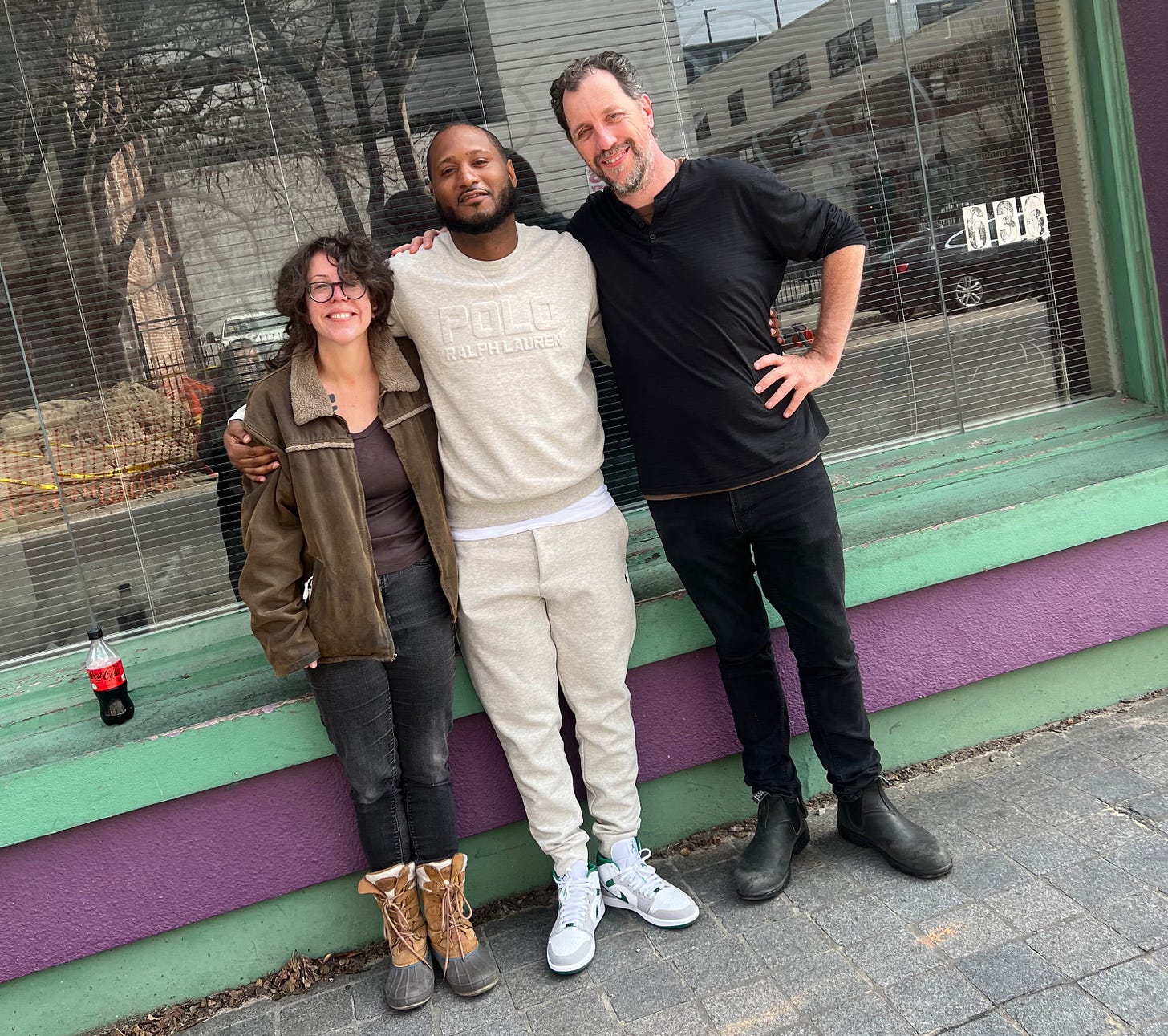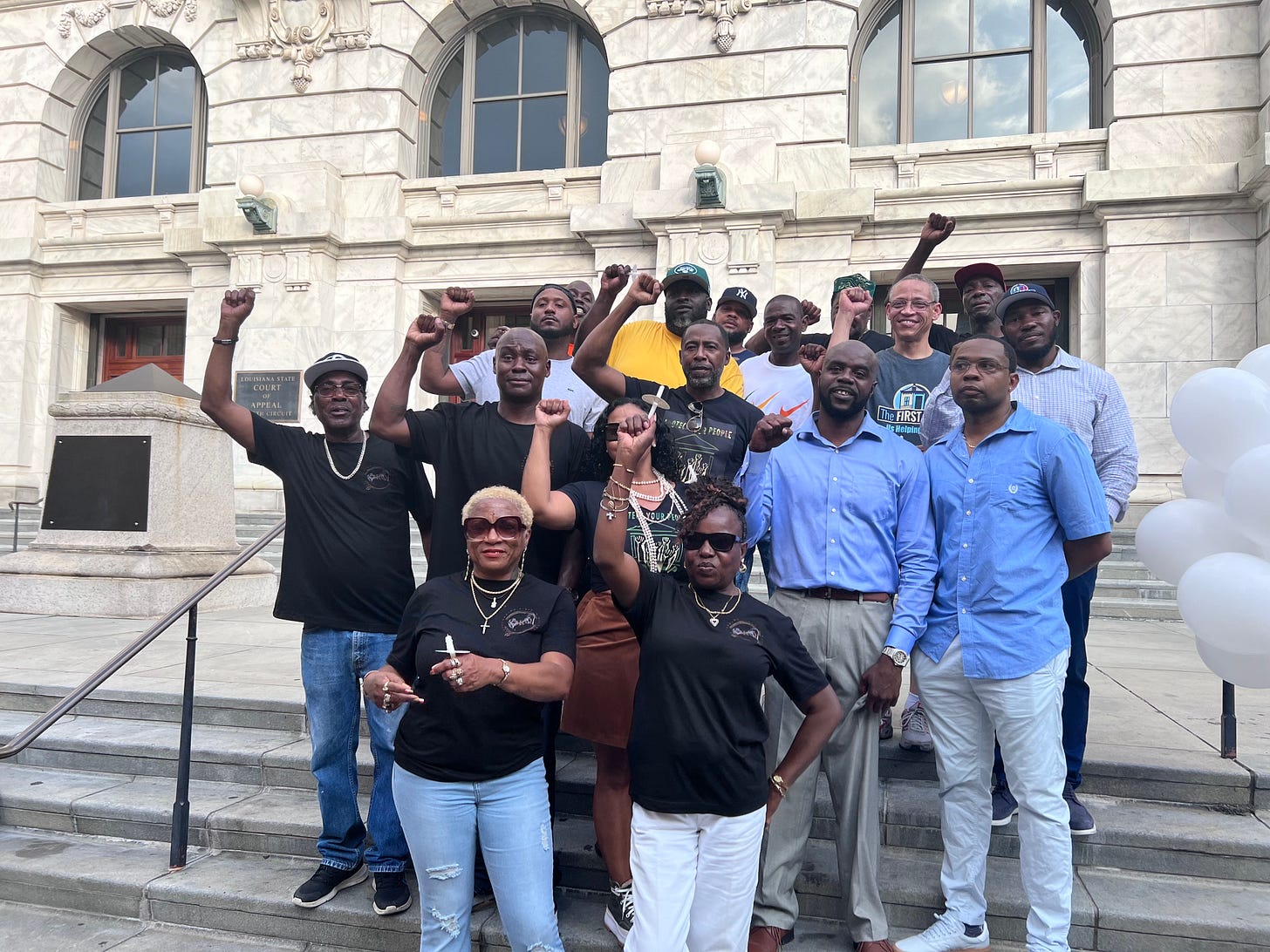I'm happy to report some good news. Mostly.
A grave injustice in New Orleans has been corrected. Sort of.

Like most of my work, this Substack will mostly consist of heavy stories about terrible things that have happened to people. So it’s worth highlighting the rare occasion that one of those stories has a happy ending. Or at least happy-ish. This post is about one of those times.
In August 2019, I wrote about Landon Quinn, a New Orleans man who was convicted of murder in 2001 based on on eyewitness testimony. He was also convicted with a non-unanimous jury — Louisiana is one of just two states that allowed that at the time. Quinn was also convicted despite the fact that the only eyewitness who identified him initially gave a description that didn’t match Quinn at all, and only changed his description to match Quinn after he was pressured by police during a leading photo lineup.
Quinn’s attorneys had all of this information, which would have impeached the witness’ credibility, but either overlooked it or forgot about it. How could an attorney do that? It may have something to do with the fact that at the time of his trial, one of Quinn’s public defenders was handling 543 felony cases. The other was handling 711. The American Bar Association recommends a defense attorney handle no more than 150 cases in an entire year.
One of those attorneys would concede his mistakes in an affidavit, writing, “These failures were inadvertent, unintentional oversights by me that were attributable to my unmanageable caseload.”
The lone eyewitness also not only had a record, he was also facing new criminal charges at the time. In the weeks before Quinn’s trial, the eyewitness had been arrested two occasions with a total of over 60 kilos of cocaine in his car. So there’s good reason to suspect he wanted to curry favor with prosecutors. Yet the judge prohibited defense attorneys from letting the jury know about the new charges. He only allowed them to mention the eyewitness’ old convictions from other states. When one of Quinn’s attorneys suggested in closing arguments that the witness may have had an incentive to lie, the prosecutor replied in his own closing, “Currying favors with who for what? A twenty year old conviction. A ten year old conviction? A 2009 conviction? All in other states?"
The prosecutor said this to the jury knowing full well that not only was the eyewitness facing major criminal drug charges at the time, but the judge had also prevented the jury from hearing about those charges. And the judge allowed it.
A couple months after my story about Quinn was published, New Orleans Saints linebacker Demario Davis mentioned my piece and Quinn’s case in an op-ed for the Baton Rouge Advocate. That won the case some local publicity.
But Quinn continued to lose in court. Regular readers by now know that once a case reaches post-conviction (that is, once a prisoner has completed his initial appeal), it can be extremely difficult to get back into court. The system priorities “finality.”
Quinn got some good luck when, in the 2020 case Ramos v. Louisiana, the U.S. Supreme Court struck down the Louisiana and Oregon laws allowing for convictions by non-unanimous juries. The court ruled that those laws violated the Constitution and were steeped in historic racism.
Unfortunately the very next year the court refused to apply that ruling retroactively. A prisoner like Quinn was forced to reckon with the fact that the highest court in the country just ruled that he had been convicted by an unconstitutional law steeped in racism, but the ruling would have zero effect on his case.
Quinn’s prospects improved when Orleans Parish elected reformist district attorney Jason Williams in 2020. Thanks to Davis’ op-ed, Quinn’s case by then had attracted a lot of local attention, and Williams’ office seemed at least a little more sympathetic to the flaws in how the case was prosecuted.
Williams’ office eventually gave Quinn the option of an Alford plea to a charge of manslaughter. In an Alford plea, a prisoner doesn’t admit guilt, but does concede that the state has enough evidence to convict. It’s often used in flawed convictions in non-DNA cases because it allows a prisoner to be released, but also allows the state to save some face. Given that he’d already served 20 years, the plea would mean that Williams would be freed from prison. So he accepted.
So the good news here is that earlier this year, Quinn was indeed released from prison. The less good news is that he’ll still have a felony record. The even better news is that he is rebuilding his life, and will start a promising new job soon.
Yesterday I received the email below, which Quinn has given me permission to publish:
Good morning Mr Radley! this is Landon Quinn from New Orleans. In 2019 you wrote such a phenomenal article on my unfortunate situation with the justice system and the impact from your article lead to miracles in my life. A professional athlete Demarius Davis wrote a spinoff of your article and made it even more powerful. Thanks for being instrumental in my long walk to freedom. Thank you so much for being brave by writing and shining a light on the injustice that was rendered to me by a broken system. May God bless you and the windows of heaven open up and shine its blessings on you!!!
I’m flattered to be called brave, but it takes a hell of a lot more courage to negotiate two decades in prison knowing you’re innocent than to merely write an article about it all. But I’m delighted that Quinn took the time to write.
After the U.S. Supreme Court refused to apply its ruling in Ramos retroactively, it fell to Louisiana and Oregon to decide whether or not to revisit all the old convictions won with non-unanimous juries. But just last month, the Louisiana Supreme Court ruled that the state will not be doing that. So other prisoners like Quinn, who were also convicted thanks to a law the U.S Supreme Court has said is racist and unconstitutional, are out of luck.
Even when the good side triumphs in these cases, it’s usually a qualified victory like this one. Quinn still had 20 years of his life taken from him, and he’ll still have a felony record.
But in an era in which it feels like we’re backsliding and repeating all the same mistakes of the 1980s and 1990s, an email like Quinn’s is a nice reminder that this work matters.





Thank you for this story!!
You made a difference. Congratulations and thank you! Now, on to the thousands and thousands of others screwed over every day by the criminal justice and family policing (nee “child welfare”) systems....😢 From a broader perspective, the most distressing thing about this case is that it is routine, not aberrational. I’m proud to contribute my subscription dollars to support your work.